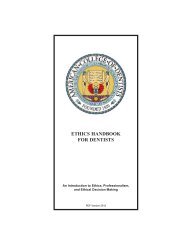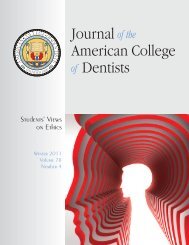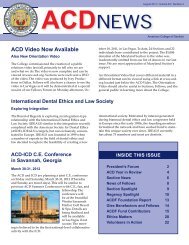JACD 71-4 - American College of Dentists
JACD 71-4 - American College of Dentists
JACD 71-4 - American College of Dentists
- No tags were found...
You also want an ePaper? Increase the reach of your titles
YUMPU automatically turns print PDFs into web optimized ePapers that Google loves.
dental education system and graduate<br />
more dentists. What is being done now<br />
to address this problem? The first<br />
response appears to be in the direction<br />
<strong>of</strong> consolidation. I’m asking the senior<br />
people involved in dental education if<br />
they may wish to consider this approach<br />
in dental education—a consolidation <strong>of</strong><br />
schools, staff, and services. This would<br />
allow for more efficient process. We are<br />
never going to get the dentists we need if<br />
we avoid this. Further, I say we need<br />
standardization in curriculum and graduation.<br />
Every time I come to San Francisco<br />
I tell myself, “I guess if I were going to go<br />
to dental school now, I’d go to Pacific<br />
because it takes thirty-six months to<br />
complete a four-year program there.”<br />
You will recall I picked the movie<br />
title “Something’s Gotta Give.” It’s not<br />
just dental schools having problems.<br />
Wisconsin Association <strong>of</strong> Independent<br />
<strong>College</strong>s and Universities says that institutions<br />
face three choices: raise tuition,<br />
raise more money through private<br />
philanthropy, or change the way schools<br />
do business. The first two methods have<br />
been explored to their limits; it is time to<br />
look at the third alternative.<br />
Restricted Mobility<br />
I want to talk about the restricted mobility<br />
<strong>of</strong> active dentists. There are many dentists<br />
in America, fully licensed and eager to<br />
practice for compensation or on a<br />
voluntary basis, who are all dressed up<br />
with no where to go because <strong>of</strong> licensure<br />
restrictions. I know about the boards<br />
and credentials that were a valuable<br />
protection to the public eighty years ago.<br />
But how would you like to drive from<br />
California to Nevada and be stopped at<br />
the borderline to take a driver’s test.<br />
America is the only country in the world<br />
that restricts intra-country practice. In<br />
Journal <strong>of</strong> the <strong>American</strong> <strong>College</strong> <strong>of</strong> <strong>Dentists</strong><br />
Doesn’t it ring false<br />
to say, he’s been<br />
practicing forty years,<br />
why does he need forty<br />
hours <strong>of</strong> continuing<br />
education before he<br />
can make his skills<br />
available to patients<br />
who need care?<br />
Europe, inter-country licensure is a reality.<br />
My motto is, “One country, one exam,<br />
one license, one time.” I’m not the only<br />
one saying this. The dentists <strong>of</strong> America<br />
want to move around. I’d like to practice<br />
three months in New Jersey and three in<br />
San Francisco.<br />
Retired <strong>Dentists</strong><br />
Retired dentists have so many destinations<br />
calling them: casinos, lakes, beaches,<br />
and golf courses. But many <strong>of</strong> them<br />
cannot go to a dental clinic to provide<br />
voluntary services. They cannot work in<br />
assisted-living facilities or in schools<br />
teaching kids how to brush their teeth<br />
or in the E.R. They do not have the right<br />
credentials—a dental license in a particular<br />
state. For me to pick up a handpiece in<br />
the migrant camps near Stockton,<br />
California, I need to have my malpractice<br />
insurance paid up here and I need to<br />
take my forty hours <strong>of</strong> continuing<br />
education. Doesn’t it ring false to say,<br />
he’s been practicing forty years, why<br />
does he need forty hours <strong>of</strong> continuing<br />
education before he can make his skills<br />
available to patients who need care?<br />
Is it inconceivable that such retired<br />
and motivated pr<strong>of</strong>essionals might be<br />
given an “easy pass?” Now when they’re<br />
down in their condo in Florida in the<br />
winter and it rains and they can’t play<br />
golf and don’t want to stay home, they<br />
can go do some good. Remember the<br />
National Leadership Symposium<br />
Good Samaritan Act? It must be a<br />
voluntary act, the recipient must not<br />
object, and the volunteer must act in<br />
good faith, which means if we are at the<br />
scene <strong>of</strong> an accident, we can administer<br />
artificial respiration, mouth-to-mouth<br />
resuscitation, or defibrillation and if we<br />
follow that statute, we’re okay. But, if<br />
we turn around and go into an assistedliving<br />
situation and try to get someone<br />
out <strong>of</strong> pain, we are violating the law.<br />
Everyone knows about Doctors/<br />
Physicians without Borders. I suggest<br />
Physicians and <strong>Dentists</strong> without Borders.<br />
Let it be in the U.S. first. There is an<br />
organization called Health Volunteers<br />
Overseas. Let’s start by tearing down the<br />
borders between states.<br />
Conclusion<br />
When I look at the pr<strong>of</strong>ession <strong>of</strong> dentistry,<br />
I see many intelligent, skilled young men<br />
and women who are passionate about<br />
the future <strong>of</strong> the pr<strong>of</strong>ession. None <strong>of</strong><br />
them is an Art Dugoni. But by working<br />
together and standing on the foundation<br />
he has built, they can move dentistry<br />
forward. One thing is certain, there is no<br />
shortage <strong>of</strong> issues for the new leadership<br />
to address. ■<br />
29





